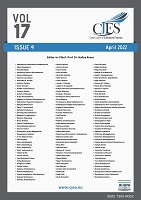Methodology of application of blended learning technology in mathematics education
Methodology of application of blended learning technology in mathematics education
Author(s): Roza Kadirbayeva, Anthony Pardala, Baktygul Alimkulova, Elvira Adylbekova, Gulzhan Zhetpisbayeva, Madina JamankarayevaSubject(s): Preschool education, Educational Psychology, Methodology and research technology, Distance learning / e-learning, Pedagogy
Published by: Birlesik Dunya Yenilik Arastirma ve Yayincilik Merkezi
Keywords: Psychological and pedagogical foundations; preschool teachers; teacher competencies;
Summary/Abstract: The purpose of this research is to evaluate the application methodology of blended learning technology in mathematics education, with the views of teachers. In this study, the case study method, which is one of the qualitative research methods, was used. A total of 80 mathematics teachers working in various high schools in Nur Sultan city of Kazakhstan participated in the research. Research data were collected with a semi-structured interview form prepared by the researchers. As a result of the research, most of the mathematics teachers stated that the students' attitudes towards the mathematics lesson were negative. The majority of teachers participating in the research stated the combination of the superior features of face-to-face learning environments, diversity in learning and teaching methods, diversity in learning– teaching materials and increase in student success as the advantages of mathematics education in a blended learning environment. The majority of teachers participating in the research stated that the inadequacy of programmes suitable for blended learning, the deficiencies of software and hardware to be used in the course and the inability to use technology efficiently and effectively are the disadvantages of mathematics education in a blended learning environment. In-service training programmes should be organised to develop teachers' self-efficacy regarding blended learning environments and to ensure that they manage assessment and evaluation processes correctly.
Journal: Kıbrıslı Eğitim Bilimleri Dergisi
- Issue Year: 17/2022
- Issue No: 4
- Page Range: 1117-1129
- Page Count: 13
- Language: English

